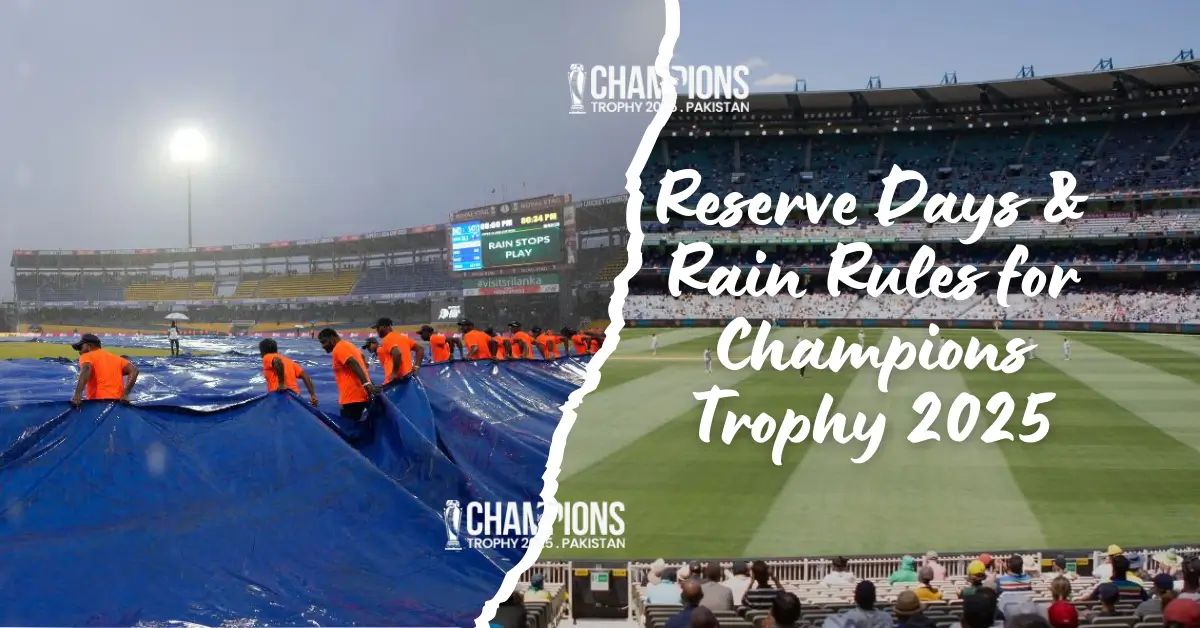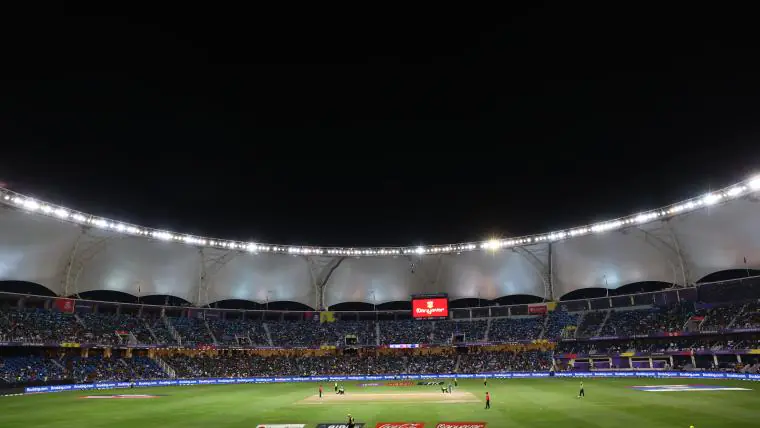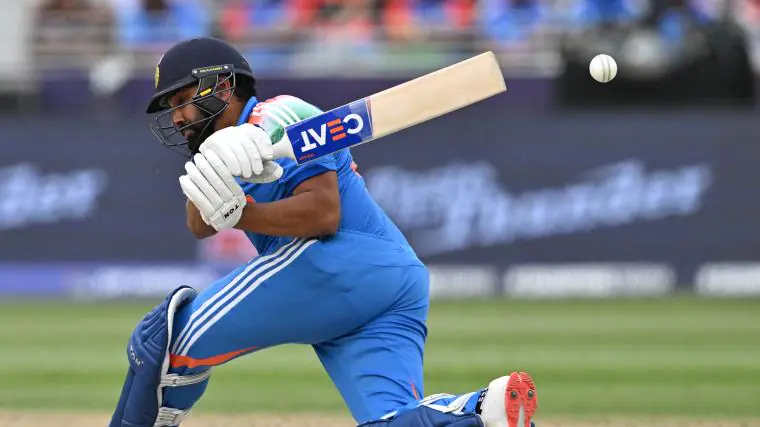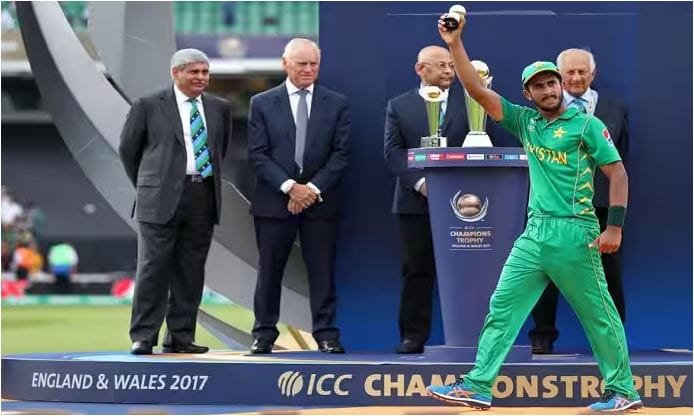
In cricket, weather disruptions can significantly impact match outcomes. To ensure fairness and maintain the integrity of the game, the International Cricket Council (ICC) has established specific protocols, including the implementation of reserve days and rain rules.
- Summary of Reserve Day Policies: The ICC has implemented reserve days for critical matches in the Champions Trophy 2025 to ensure that weather disruptions do not unfairly affect the outcome.
- Importance of Rain Rules in Ensuring Fairness: Standardized rain rules, such as the DLS method, are crucial in maintaining fairness and integrity in cricket matches affected by weather.
- Preparedness for Weather-Related Challenges in 2025: The ICC’s proactive measures, including reserve days and the DLS method, demonstrate a commitment to handling weather-related challenges effectively in the upcoming Champions Trophy 2025.
Importance of Weather Considerations in Major Tournaments
Major cricket tournaments, such as the ICC Men’s Champions Trophy, often span several days and are held across multiple venues. This extended schedule increases the likelihood of weather-related interruptions. To mitigate the impact of such disruptions, the ICC has developed comprehensive policies, including the provision of reserve days and the adoption of standardized rain rules.
Overview of the ICC Men’s Champions Trophy 2025
The ICC Men’s Champions Trophy 2025 is scheduled to take place from February 19 to March 9, 2025. This tournament marks the return of the Champions Trophy since its last edition in 2017. The competition will feature eight top cricketing nations competing across 15 matches.
Tournament Schedule and Key Venues
The matches will be hosted across two primary venues:
- Pakistan: Matches will be held at the National Stadium in Karachi, Gaddafi Stadium in Lahore, and Rawalpindi Cricket Stadium in Rawalpindi.
- United Arab Emirates (UAE): The Dubai International Cricket Stadium in Dubai will also host several matches.
Group Stage Matches
The group stage will feature round-robin matches, with each team playing against the others in their group. The top teams from each group will advance to the knockout stage.
Knockout Stage and Finals
The knockout stage will consist of semi-finals and a final. The semi-finals are scheduled for March 4 and 5, with the final on March 9. Notably, both semi-finals and the final have reserve days allocated to accommodate potential weather disruptions.
Implementation of Reserve Days
To ensure that matches can be completed even if weather interruptions occur, the ICC has implemented reserve days for critical matches:
- Matches with Allocated Reserve Days: Both semi-finals and the final have reserve days scheduled. For instance, if the final on March 9 is postponed due to weather, it will be rescheduled for March 10.
- Procedures for Utilizing Reserve Days: If a match cannot be completed on its scheduled day due to weather, the reserve day is utilized. The match will resume from the point it was interrupted, ensuring a fair contest.
Rain Rules and Match Outcome Determination
Rain can disrupt the flow of a cricket match, especially in limited-overs formats. To address this, the ICC employs the Duckworth–Lewis–Stern (DLS) method to recalculate target scores during rain-affected matches.
Evolution of Rain Rules in Cricket
- Pre-DLS Methods and Their Limitations: Before the introduction of the DLS method, various methods like the Average Run Rate and Most Productive Overs were used. However, these methods often led to unfair outcomes, as they did not account for the number of wickets lost or the match situation at the time of interruption.
- Introduction and Adoption of the DLS Method: The DLS method was introduced in 1997 by statisticians Frank Duckworth and Tony Lewis. It was officially adopted by the ICC in 1999 and later refined by Steven Stern in 2014 to better fit modern scoring trends.
Application of the DLS Method in the Champions Trophy 2025
- Scenarios Triggering the DLS Method: The DLS method is applied when a match is interrupted by weather, resulting in a reduction of overs. It recalculates the target score for the team batting second, considering the number of overs remaining and wickets in hand.
- Calculating Target Scores During Interruptions: The DLS method uses a resource table to determine the percentage of resources available to each team at any point in the match. This ensures that the revised target reflects the match situation accurately.
Historical Impact of Rain on ICC Tournaments
Rain has historically affected several ICC tournaments, leading to shared titles and altered match outcomes.
Notable Rain-Affected Matches
- 1992 World Cup Semi-Final: England vs. South Africa: In this match, rain interrupted play, and the then rain rule left South Africa needing 21 runs from one ball, a virtually impossible target. This highlighted the inadequacies of previous rain rules.
- 2013 Champions Trophy Final: England vs. India: Rain led to a reduced-overs match, with India eventually winning the title.
Lessons Learned and Policy Changes
These incidents underscored the need for a more equitable system to handle rain-affected matches, leading to the development and adoption of the DLS method.
Strategies to Mitigate Weather Disruptions
To minimize the impact of weather on match outcomes, the ICC has implemented several strategies:
- Scheduling and Venue Selection: Careful planning of match schedules and selection of venues with favorable weather conditions can reduce the likelihood of weather disruptions.
- Technological Innovations in Weather Prediction: Advancements in weather forecasting technology allow for better planning and decision-making during matches.
- Infrastructure Enhancements for Rapid Recovery: Improved ground preparation and drainage systems enable quicker resumption of play after rain.
Frequently Asked Questions (FAQs)
- What is a reserve day in cricket tournaments?:
- A reserve day is an additional day scheduled to complete a match that was interrupted by weather or other unforeseen circumstances.
- How does the DLS method work?:
- The DLS method recalculates the target score for the team batting second in a limited-overs match that has been interrupted, considering the overs lost and wickets in hand.
- Which matches in the Champions Trophy 2025 have reserve days?:
- Both semi-finals and the final of the Champions Trophy 2025 have reserve days allocated to accommodate potential weather disruptions.
- How has rain historically affected major cricket tournaments?:
- Rain has led to shared titles and altered match outcomes in past tournaments, highlighting the need for fair and standardized rain rules like the DLS method.
Check out the Champions Trophy Stats


